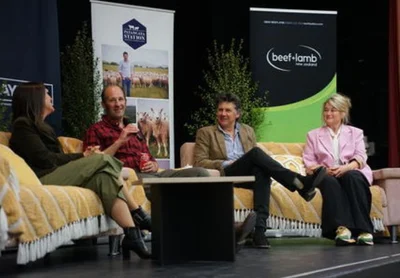Agrisummit showcases ways to diversify

Luxury farm retreats, solar panels and tasty salami - a first-of-its-kind summit has helped farmers explore new ways to make money off of their land.
The first Beef + Lamb New Zealand Agri Innovation Summit was held in Methven last week.
The summit showcased new ways for farmers to make income from their land, with presentations on agritourism, solar farming and business diversification.
The straight-talking economist Cameron Bagrie was the headline speaker.
He gave the around 140 farmers a wrap up of the state of New Zealand’s economy, saying the country’s model was old and “It’s not just about what’s going on here in New Zealand, you’ve got to look globally.”
He said worldwide conflict, the rise of polarised political parties in the West, and new emerging markets were some of the major influencers.
Local far-left and far-right politics had begun to imitate America and the UK, he said, which meant parties spent more time “throwing jabs” than creating solid policy.
“When you drive divisive policies, you’ve gonna end up reciprocating spite from the other side.”
“Somehow, globally and in New Zealand, we’ve got to bring those two sides together.”
He said farmers continued to be New Zealand’s most productive lot, with productivity across agriculture sitting at around 2%, while the country as a whole faced a productivity crisis.
“I’ve got to give you guys credit for that.”
Mt Somers farmer Duncan Humm spoke about his journey with solar farms. Humm has leased around 35 of his family’s 150 hectare dryland farm for solar panels, in conjunction with joint venture HES Aotearoa, and solar farm installer Lodestone Energy.
Humm said he “can’t stay on one thing for too long,” and said he’d considered dairying and irrigation schemes on top of the deer he’d been farming to diversify land use.
He eventually settled on a solar farm.
Humm said land used for solar panels could be used twice over, as sheep could come in and graze the paddock without destroying the panels.
“We’ll have to go back to sheep, which I’m not the biggest fan of,” he joked with the crowd.
Humm also runs the NZ Farming Facebook and Instagram page.
Agritourism New Zealand founder Marijke Dunselman shared about how farmers could run tours and stayovers on their land as a tourist attraction.
“You have something really valuable that people want to see.”
Dunselman has worked with several farmers to create tourist farm retreats and experiences across the country, through the organisation’s accelerator and academy programmes.
She said there were several perks to agritourism, from educating the non-rural public on farm life, to promoting the produce of your farm.
Dunselman started Agritourism New Zealand in 2019 after working as a business consultant.
Hawke’s Bay farmers Duncan Smith and Annabel Tapley-Smith spoke about expanding their operations to include a butchery, catering service, and even a fish and chips shop.
They also run farm tours through their property at Patangata station.Tapley-Smith said diversifying their income streams has helped show their kids the impact of productivity.
“Sometimes we have our kids helping out in the butchery.”
“They had a class on GST, and no one in the class put their hands up. But one of our kids did.”
“They’re being taught the importance of working hard and productivity.”
The couple purchased the Waipara Butchery in 2017 and said it has paid dividends since.
Beef + Lamb chairperson Kate Acland said the Methven event had seen a great turnout.
“It’s been pretty good, a good range of speakers, good range of farmers here, too.”
“It's really important for farmers to get off farms, to connect, and actually start thinking about the other opportunities out there, that sit alongside their farming business.”
“So it’s not diversifying away from farming, this is around new things that we can do on farms that complement our existing businesses.”
She said diversification was an important step in protecting a farmer’s livelihood.
By Anisha Satya
